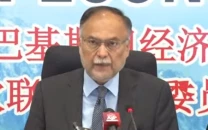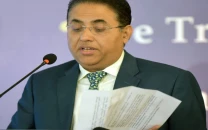Gaps in anti-laundering efforts: IMF
Says ownership data underused despite FATF reforms; govt disputes assessment

The International Monetary Fund (IMF) has observed that Pakistan is not effectively using data on the ultimate real owners of companies, creating hurdles in disrupting corruption-related laundering schemes and checking front companies from securing government contracts.
The global lender's draft report on the Governance and Corruption Diagnostic Assessment revealed major flaws in the effective implementation of the country's beneficial ownership regime.
The IMF found "little evidence of routine coordination" between the Securities and Exchange Commission of Pakistan (SECP) and investigation agencies for exchanging and using beneficial ownership data in financial investigations.
However, Pakistani authorities disagreed with the IMF's findings, stating that agencies were using beneficial ownership data, except in the case of Designated Non-Financial Businesses and Persons (DNFBPs).
Pakistan tightened its beneficial ownership rules about eight years ago as part of Financial Action Task Force (FATF) conditions. However, as in many other cases, implementation remains far below the desired goals.
The IMF stated that effective use of beneficial ownership information in financial investigations requires regular exchanges between the SECP, the State Bank of Pakistan (SBP), the Federal Board of Revenue (FBR), commercial banks, money service providers, and investigation agencies.
The IMF's diagnostic mission recommended that Pakistan institutionalise a multi-agency working group to review beneficial ownership data in support of corruption investigations.
The IMF noted that Pakistan's beneficial ownership framework is an important foundational tool, but weaknesses in registry implementation, verification, enforcement, and inter-agency access reduce its impact.
"Addressing these challenges will be essential to ensuring that beneficial ownership transparency plays a meaningful role in the identification and disruption of corruption-related laundering schemes," the global lender observed.
It added that access to accurate and timely beneficial ownership data is essential not only for detecting illicit financial flows but also for uncovering conflicts of interest in public procurement, particularly when public officials or their close associates have undisclosed stakes in bidding firms.
Pakistani authorities said that, as part of effective inter-agency coordination, the SECP has provided direct access to its beneficial ownership database to investigation agencies. They said the Financial Monitoring Unit (FMU) was regularly using the data to analyse suspicious transactions.
In 2018, the SECP directed companies to collect information about their real owners to address FATF concerns about transparency in company ownership structures. The directions had been given to uncover layers of secrecy hiding ultimate beneficial owners.
All companies with legal persons as members or shareholders are required to obtain and maintain information from their members and shareholders about the ultimate beneficial owners.
The minimum information required includes the owner's full name, father's or husband's name, NIC/NICOP/passport number, nationality, country of origin, email address, usual residential address, the date on which the name was entered into the register, and the date and reason the person ceased to be the beneficial owner.
Section 453 of the Companies Act 2017 also requires every company officer to endeavour to prevent fraud and offences of money laundering, including predicated offences under the Anti-Money Laundering Act 2010, in relation to the company's affairs.
However, the IMF found serious gaps in the implementation of these laws and rules, hindering the disruption of illicit money flows.
Global bodies agree that collusive practices can only be mitigated by exposing front companies used to siphon public funds and by supporting fair competition in government contracting.
The IMF said that ensuring contracting authorities, integrity bodies, and investigative agencies can effectively access and cross-reference beneficial ownership data with procurement records is critical to advancing governance reform and restoring public trust.
The effectiveness of financial institutions and Designated Non-Financial Businesses and Professions (DNFBPs) in detecting and reporting corruption-linked transactions remains limited, the IMF stated.
Pakistan's legal and regulatory framework requires reporting entities — including banks, money service businesses, and DNFBPs — to implement risk-based customer due diligence, conduct enhanced due diligence on politically exposed persons (PEPs), and file suspicious transaction reports (STRs). However, implementation is uneven and often inadequate in addressing high-risk areas associated with corruption.
Pakistani authorities said some state agencies were actively using the SECP's online beneficial ownership database to enrich financial intelligence. The FMU continues to advocate improved access to beneficial ownership data for key stakeholders and stronger implementation of anti-money laundering obligations by reporting entities through targeted guidance, training, and inter-agency collaboration.
Financial institutions have made notable progress in applying risk-based customer due diligence and conducting enhanced due diligence on politically exposed persons (PEPs).
However, challenges remain, particularly in the DNFBP sector, where the level of technical capacity, compliance culture, and supervisory coverage vary, according to Pakistani authorities.























COMMENTS
Comments are moderated and generally will be posted if they are on-topic and not abusive.
For more information, please see our Comments FAQ